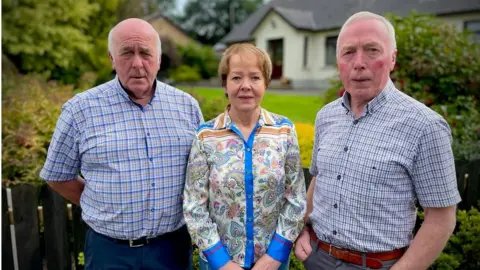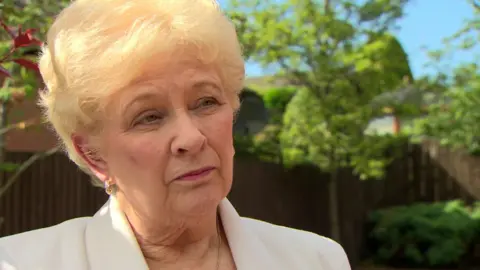Legacy bill: Victims' family challenges PM to drop legislation
 BBC
BBCThe family of a couple murdered by loyalist paramilitaries in 1975 have challenged the prime minister over the government's controversial legacy bill.
The bill is expected to clear the final hurdle at Westminster this week.
Once passed, the legislation will end all Troubles-related court cases and inquests.
It will also offer a conditional amnesty to those accused of killings in return for information about their crimes.
But the family of Peter McKearney, 63, and his 58-year-old wife Jane have criticised the bill.
The couple were shot dead by the UVF at their home in Moy, County Tyrone.
 Reuters
Reuters"Does my father and mother not count for anything, like thousands of other victims?" said Jim McKearney.
He said if the prime minister "stood where I stood he would have a different view and if he thinks we can just draw a line under what happened, we can't".
Jim McKearney was the first on the scene when two UVF gunmen murdered his parents.
He found his mother in the hallway. She had been shot 11 times. His father had been hit 18 times and was found in the kitchen.
"I didn't know what do. I didn't have any first aid so I just tried to give them a drink of water. That scene will never leave me and even to this day I can't really talk about it," Mr McKearney added.
'Riddled with bullets'
His sister Marian had just left the house to visit friends before the gunmen arrived.
She heard her parents had been murdered on the radio that evening.
"I remember hearing the newsreader say there had been a double murder, in what was known then as the murder triangle, and then they said the couple have been named locally as Peter and Jane McKearney," she added.
"I ran out the back door and didn't stop and from that moment my life was never the same again."
When she returned to the house the following day she found every room riddled with bullets.
"Even the saucepans in the kitchen and the washing machine were all full of bullets holes," she said.
'Easy targets'
Her brother Paul said the attack "destroyed their youth" and they "all had to grow up very quickly".
He said his parents were "easy targets" in what was a random sectarian killing.
Only one person was convicted in relation to the attack.
Garnet Busby from Moygashel spent 16 years in jail for his part in the double murder but he refused to provide the names of the other UVF gunmen.
The McKearney family fear the other members of the gang will escape justice once the government's legacy bill becomes law.
"If any politician lost their parents at 20 years of age do you think they would just push it to the side and move on, it doesn't work like that - you can never just move on," said Jim McKearney.
While his sister Marian invited the prime minister to walk in "her shoes".
"He will never know what it is like to live the life we have, if he did he wouldn't go ahead with this bill," she added.

Speaking in the House of Lords as the bill was debated on Tuesday, Baroness Nuala O'Loan said the government has a "moral duty" to support those seeking truth and justice, adding that the bill in its final form would impede that.
"All political parties in the UK with the exception of the Conservative party, political parties in Ireland, the US, victims groups, community groups, have all declared the bill to be unacceptable because of its manifest deficiencies and because the breach of international legal obligations," the former NI police ombudsman said.
"The secretary of state and the noble lord, the minister, keep reiterating that resources must be found within the Northern Ireland budget.
"Yet what happened in Northern Ireland over those years of the Troubles was not the responsibility of paramilitaries alone - agents of the state also played their part."